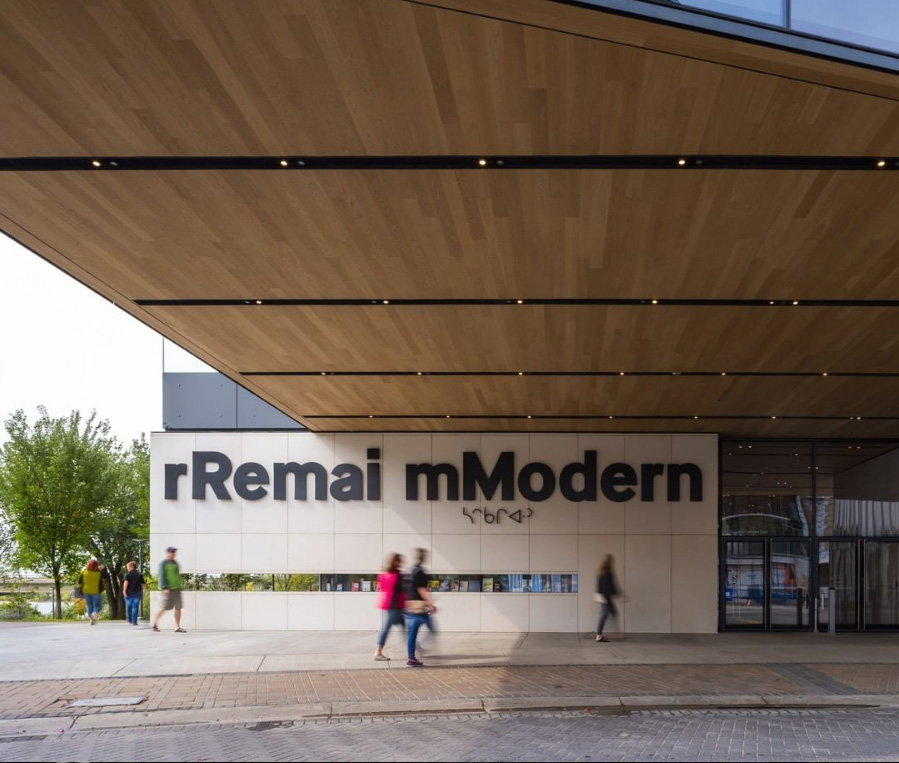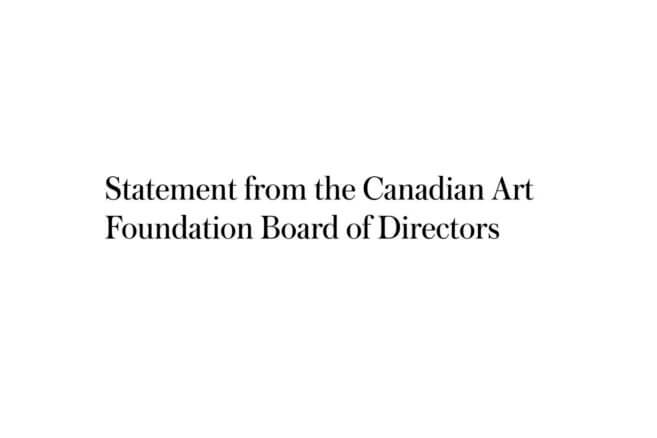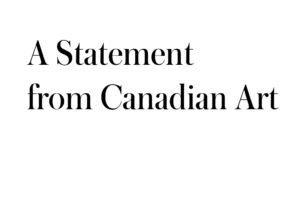At the Remai Modern, there’s a new board chair, new attendance and revenue numbers, and a new op-ed from the newly departed CEO. After some significant turnover in its board and staff, the Remai Modern has named lawyer Beau Atkins as its new board chair. Just before Atkins was appointed, new attendance and revenue numbers were released for the first year of operations: the attendance was strong, but some revenues fell short. And just before that report, the just-departed CEO Gregory Burke, currently under investigation due to a Saskatchewan Human Rights Commission complaint, wrote an op-ed opining that nobody at City Hall thanked him when the Remai Modern successfully opened, and warning that “the politicized forces that worked to undermine this feat” could be bad for the gallery in the long term. (Saskatoon StarPhoenix, CBC, Saskatoon StarPhoenix)
A Canadian artist is fighting US politician Steve King on copyright violation. “A Canadian artist is demanding a full apology and retraction from divisive US Congressman Steve King, alleging copyright infringement over an image the Iowa Republican used in a Facebook post. The post—which has since been deleted—suggested Republicans would win a civil war over Democrats,” reports the Globe. “I was outraged to see my image taken [and] used, but I was doubly horrified to see it hijacked by such a hateful and toxic message,” artist Yarek Waszul told the Globe. (Globe and Mail, Washington Post)
Artists allege former gallery owner owes nearly $32K for missing or sold art. That’s the headline on a CBC story about Engine Gallery, formerly located in Port Hope, and before that in Toronto’s Distillery District. “I’ve made so many good things happen, but when I was closing up there were a lot of things that went wrong,” said [owner Steven] Schwartz to the CBC. “I feel sad for everyone but at this point I just don’t have the money.” It’s not just money that is at stake, though—many of the artists’ works are missing. (CBC)
Federal funding denied for an important Indigenous arts initiative. “The inaugural season of the National Arts Centre’s Indigenous Theatre will go forward in a ‘greatly diminished capacity’ this year after $3.5 million of requested federal funding was denied,” CBC reports. “Without ongoing financial support, we will not have the capacity to achieve our vision and full impact,” the artistic director of the program, Kevin Loring, wrote on Facebook. “I have now been put in the disturbing position of overseeing a department whose creation and existence is a financial burden to an already stressed institution.” (CBC)
The Art Gallery of Ontario’s deaccessioning of A.Y. Jackson works is proceeding apace, with Heffel announcing it will sell 17 of the paintings at its spring auction. “Heffel offers [a] rare opportunity as several A.Y. Jackson works from the AGO vault head to auction,” says a recent Heffel press release. The CBC reports that the canvases are estimated to sell for more than $660,000 in total. As per museum policies, the revenues will go back into the acquisition fund for Canadian and Indigenous art—with, the museum has stated, a particular focus on “underrepresented artists.” (press release, CBC)
A new art-law change in the federal budget “may have prevented Leibovitz debacle” at the Art Gallery of Nova Scotia. According to CBC, Budget 2019’s promise to remove “national importance” criteria from the art-donation tax-credit bonus in Canada could have saved the AGNS—as well as an artist, and a donor—a lot of time and money a few years ago. Toronto collectors the Mintz family had bought a selection of Annie Leibovitz’s archives for $4.75 million in 2013, and donated it to the gallery shortly thereafter, with the hope of getting the tax credit. But it was told criteria were not met, and it was later revealed some were worried about the donation a tax grab. Leibovitz has also been under financial pressure as a result. “Gallery spokesperson Colin Stinson said staff are still figuring out what the change could mean for the gallery,” CBC reports. “Anything that makes the process of getting art certified for donor tax incentives ‘a little bit friendlier’ for institutions is good, he said. But Stinson said it’s ‘impossible to say’ whether the proposed change would have allowed the Leibovitz exhibit to proceed more smoothly had it been introduced earlier.” (CBC)
Get ready for what might just be the first toy-invention program in Canada—and an art school is involved. According to press release, OCAD University, Ryerson University and Spin Master Toys are partnering “to create a new Course Series in Toy Invention that focuses on entrepreneurship in the toy industry and provides key perspectives on what it takes to bring great ideas and inventions to market. This one-year program will begin in September 2019, and will be offered through The Chang School [of Continuing Education at Ryerson] in collaboration with FCAD, Spin Master and OCAD University.” (press release)
Vancouver’s Trans Am Totem is saved. The public art piece, which had been at risk of being demolished, has been rescued, it’s said, with a $250,000 donation from Lululemon founder Chip Wilson and his wife Shannon. The sculpture by Marcus Bowcott and Helene Aspinall was installed as part of the 2015 Vancouver Biennale, but the biennale’s finances only cover a temporary installation cost. Biennale director Barrie Mowatt told the Vancouver Sun that the organization “needs donors to make four other works permanent,” including ones by Dennis Oppeneheim, Bernar Venet, John Clement and Magdalena Abakanowicz. (Vancouver Sun)
Another Canadian artist has been announced for the official Venice Biennale program. Vancouver-raised artist Zadie Xa, who trained at Emily Carr University and is now based in the UK, will be part of a new performance program happening in the first and final weeks of the official Venice Biennale exhibition “May You Live in Interesting Times.” The main exhibition is curated by Ralph Rugoff. The performance program is co-produced with Aaron Cezar of the London-based nonprofit Delfina Foundation and supported by Arts Council England, Artforum reports. In recent months, it was revealed that Canadian artists Stan Douglas and Jon Rafman would be included in the main exhibition there. (Artforum)
Michèle Pearson Clarke is Toronto’s new photographer laureate. Clarke takes over from Geoffrey James, whose term recently ended. In a new interview on CBC Metro Morning, Clarke discusses what she hopes will come from the role. If approved by City Council on April 16 and 17, Clarke will hold the position for a period of three years, with an annual honorarium of $10,000 and the mandate to champion photography and visual arts in the city, as well as to create a legacy project sparking dialogue on contemporary issues. (CBC Metro Morning, press release)
Nunavut’s only museum has a new manager and curator, Inuit Art Quarterly reports. “The Nunatta Sunakkutaangit Museum in Iqaluit, NU, the Territory’s only museum, announced recently that Jessica Kotierk has been hired as the Manager and Curator,” writes IAQ. “Kotierk takes on the role following a position as Projects Manager with the Nunavut Film Development Corporation. She holds a Bachelor’s Degree in Film Studies from York University, a Diploma in Collection Management and Conservation from Fleming College and has also worked with the Inuit Heritage Trust, the Canadian Conversation Institute, Mobilizing Inuit Cultural Heritage, the McMichael Canadian Art Collection and the Cerny Inuit Collection.” (Inuit Art Quarterly)
Get ready for more Kusama selfies in your feed. Donor previews start April 5 for Canada’s first museum-owned Kusama Infinity Room. It opens to the public May 23. For deeper background on this acquisition and its implications, read Merray Gerges’s essay on Kusama’s show in Canada, and related social media activity, last year, as well as Leah Sandals’s article about what went wrong (and right) with the AGO’s attempt to crowdfund this new Infinity Room.
In case you missed it: Three artists have won Scotiabank New Generation Photo Awards. There are more artists than auto workers in Canada—but they’re much more poorly paid, says a new study. And have you been waiting for a public artwork that will at last address the legacy of Bryan Adams’s album Reckless? Your wishes will be answered, for a time, at the Polygon Gallery in North Vancouver, thanks to artist Kevin Schmidt.

 The Remai Modern in Saskatoon. Photo: Instagram / @remaimodern.
The Remai Modern in Saskatoon. Photo: Instagram / @remaimodern.




